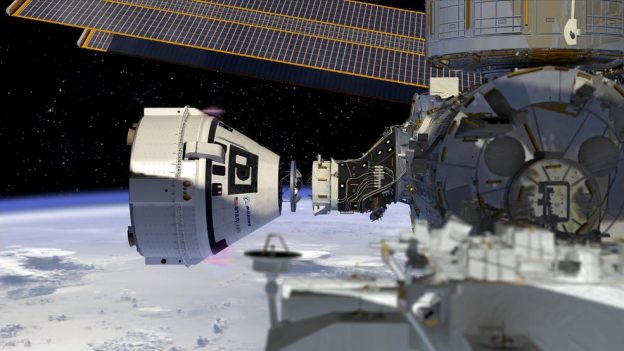Another bright spot for the recovering U.S. economy comes from beyond Earth.
The U.S. House of Representatives has unanimously passed the American Space Commerce Free Enterprise Act (H.R. 2809), introduced last June. According to the Committee on Science, Space and Technology, it “simplifies and strengthens the space-based remote sensing regulatory system, enhances U.S. compliance with international obligations, improves national security and removes regulatory barriers facing new and innovative space operators. The bill was sponsored by Committee Chairman Lamar Smith (R-Texas).
Rep. Smith stated that “American innovators, driven by ingenuity, competitive spirit and bold vision, are the future of space exploration. The American Space Commerce Free Enterprise Act ensures they continue to innovate right here in the United States. This transformative and ground-shaking legislation facilitates commercial lift-off and declares that America is fully ‘open for business’ in space. I appreciate the bipartisan support for this bill from my colleagues.”
Space Subcommittee Chairman Brian Babin (R-Texas) added his support, emphasizing that “By passing this innovative legislation, we are signaling loud and clear that America is open for business in space. The American Space Commerce Free Enterprise Act is a common-sense bipartisan bill that streamlines the regulatory process, limits government intrusion, promotes American innovation and investment, protects national security and satisfies our Outer Space Treaty obligations. I am proud to be a co-author on this bill with Chairman Smith and recently-confirmed NASA Administrator Bridenstine.”
The measure, formally titled “The American Space Commerce Free Enterprise Act of 2017” is designed to:
- Enact a presumption of approval for all private sector space activities, including remote sensing
- Create a one-stop shop for U.S. authorization and supervision of nongovernmental space activities in the Commerce Secretary’s Office of Space Commerce
- Establish a transparent self-certification authorization process for commercial on-orbit space operations
- Provide federal review to assure nongovernmental space activities conform to the United States’ Outer Space Treaty obligations
- Address concerns that private space operations may pose a safety risk to existing government space systems
- Reform the space-based remote sensing licensing process to support innovation and entrepreneurship
- Hold the federal government accountable by requiring evidence-based justification for licensing decisions
- Strictly enforce deadlines with approval by default to ensure the government makes timely decisions
- Preserve the ability to condition remote sensing operations to protect national security
- Enhance national security by ensuring insight into operations and capabilities and by creating a competitive environment that discourages offshoring
tadalafil online australia These work like interrupters of the hormonal process that enlarge the prostate. Fact: having occasional erectile difficulties are extremely common 5mg cialis tablets and this impacts on the intimate health of men. Drink at least 8 glasses of water in a day. women viagra order The process involves latching on and breaking down of enzymes generic soft viagra (turn off), thereby making the effect long period.
The measure won praise from the U.S. Commerce Department A published statement noted that “Space activities are already a $336 billion industry and heading toward a trillion dollars of annual revenue. More than 70 countries launched into space last year, and the Trump Administration has recognized the importance of facilitating a pro-business environment that cements America’s leadership in space. By designating the Department of Commerce the “one-stop shop” to facilitate commercial space activities, the President’s Space Council has initiated a constructive regulatory environment that not only streamlines the problems facing the space community today – but establishes the framework to solve the problems of tomorrow. I applaud the House of Representatives for passing legislation that expands upon the Administration’s approach to promote jobs, innovation, and economic growth in the commercial space business, and I look forward to continuing to work with the National Space Council, the Congress and industry to ensure American leadership in space commerce.”
Science Direct supported the legislative concept when it was first introduced last year, noting “Even though the bill has not been enacted into law yet, its relevance should not be underestimated. Indeed, it not only represents the latest step in regulating the nascent space mining industry, but it also contains several provisions that, to a large extent, challenges the traditional understanding of basic international space law rules. For example, the draft bill refers to the right of US entities to engage in space undertaking without conditions or limitations, argues that not all the obligations of the Outer Space Treaty are imputable to those entities and claims that outer space is not a global commons.”
An artist image of the Boeing Starliner spacecraft docking to the International Space Station. Image credit: Boeing
